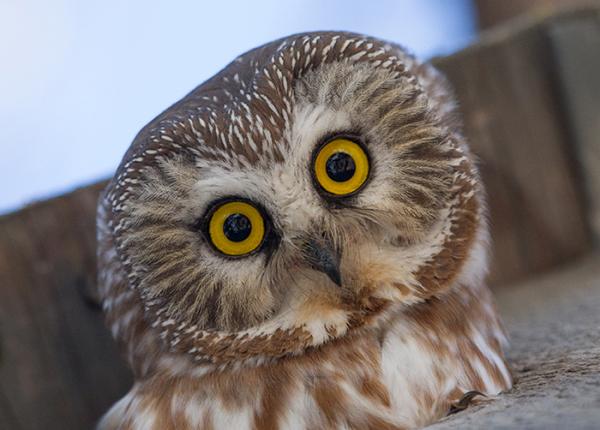From Center for Wildlife
Since the start of November, we have admitted 33 owls to our Wildlife Medical Clinic (see below to learn why). A vast majority of these have been barred owls, our most common owl species found in our region, but we have also admitted a couple of our smallest regional owls.
Pictured here are the two smallest of our regional owls, the Eastern Screech Owl and the Northern Saw-whet Owl. The Northern Saw-whet Owl is the smallest of our regional species and maxes out at about 7-8 inches tall and typically weighs under 150 grams. These secretive little owls usually prefer well-forested habitats and are most commonly found in the shelter of densely foliated conifer trees. The Eastern Screech Owl comes in at a whopping 6-10 inches tall and is a cavity dweller that loves to nest in the cavities of old growth trees in mixed -forest habitats.
The Northern Saw-whet Owl pictured here came to us after a window strike. The Eastern Screech Owl, along with the vast majority of the other owls admitted this month came to us after being hit by cars. This time of year, sunset lines up perfectly with evening rush hour traffic. As the favorite hunting time of many of our owls overlaps with increased cars on the road, we regularly see increases in instances of owls being hit by cars. Rubbish that collects along roadways attracts small mammals which then attract owls on the hunt. When swooping down in pursuit of prey, owls commonly must pass in front of cars traveling on busy roadways.
Here are some things you can do to help owls:
Keep roadways clean by never disposing things from your car (including biodegradable items), leaving your trash in a covered receptacle, or by conducting roadside cleanups!
Slow down! Drive slow and stay vigilant when driving through heavily wooded areas.
If you see an owl in the roadway, give them a hand. Sometimes birds are stunned and may take off from a safe area or if injured, wrap them in a towel and transport them to your nearest licensed care facility.
Looking for more tips for wildlife rescue, head to our website!


Duo…lingo
These 2 look a lot less aggressive than Duo! 😅